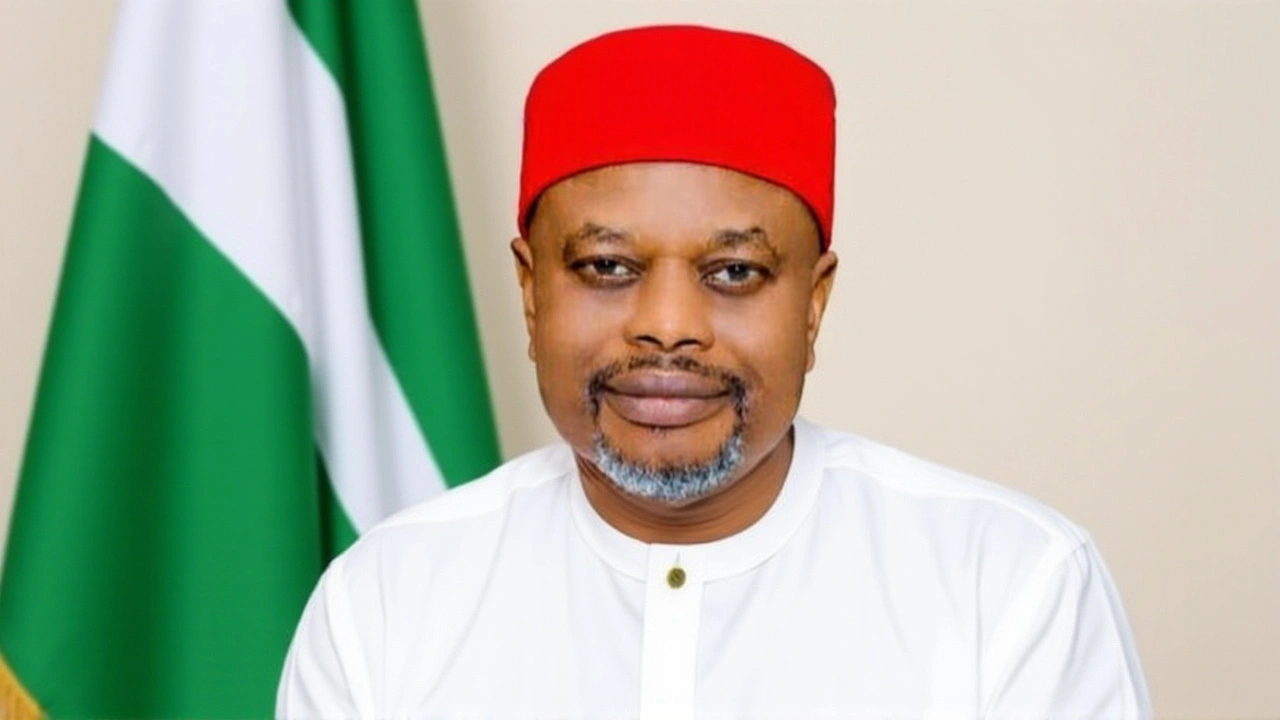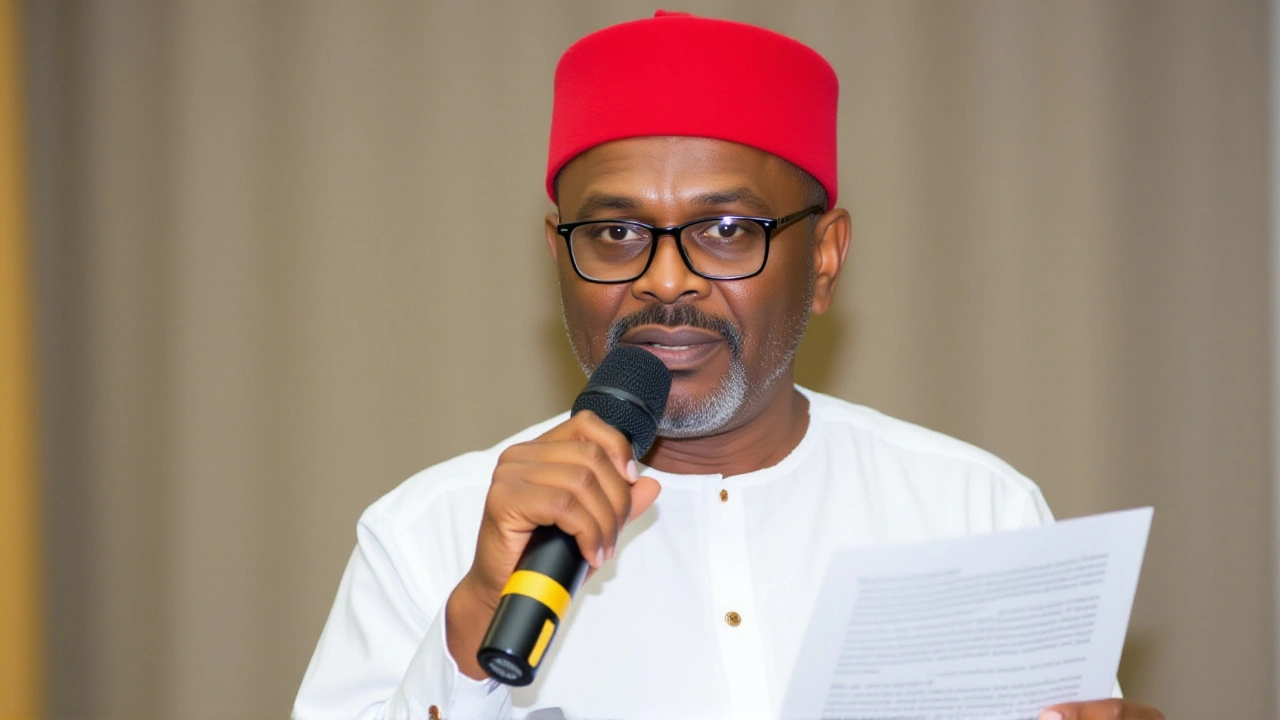9 Oct 2025
- 12 Comments
When Geoffrey Uche Nnaji, Minister of Innovation, Science and Technology of Nigeria handed his resignation letter to President Bola Ahmed Tinubu at the State House in Abuja on October 7, 2025, the nation watched a drama that felt part political thriller, part courtroom saga. Bayo Onanuga, the President’s Special Adviser on Information, confirmed the acceptance of the resignation just hours later. The fallout stemmed from an exposé by Premium Times, which revealed that the minister’s degree from the University of Nigeria, Nsukka and his National Youth Service Corps (NYSC) discharge certificate could not be verified. The scandal has already rattled the ruling All Progressives Congress (APC) and reignited calls for deeper vetting ahead of the 2027 general elections.
Background: A Ministry Born of Ambition
President Tinubu created the Ministry of Innovation, Science and Technology in August 2023 to signal a tech‑forward agenda. Geoffrey Nnaji, then a 68‑year‑old civil engineer‑turned‑politician, was tapped for the role after a Senate screening on August 15, 2023. At that time, he presented what he claimed was a Bachelor of Science in Civil Engineering from UNN, dated 1975, and a NYSC discharge certificate issued in 1976.
Timeline of the Scandal
- Sept 28‑Oct 2, 2025 – Premium Times files Freedom of Information (FOI) requests with UNN and NYSC.
- Oct 3, 2025 – UNN Registrar Prof. Charles Arizechukwu Igwe says the university cannot verify Nnaji’s degree.
- Oct 4, 2025 – NYSC Director‑General Brig. Gen. Yohanna Y. Bitrus (rtd) confirms the discharge certificate was never issued.
- Oct 5, 2025 – Premium Times publishes a detailed exposé, sparking a media firestorm.
- Oct 7, 2025 – Nnaji resigns; President Tinubu accepts; the press release is issued by Bayo Onanuga at 11:47 PM WAT.
- Oct 15, 2025 – Next hearing scheduled at Enugu Magistrate Court II (Case No. ENM/456C/2025).
Reactions from the Political Landscape
In his resignation statement, Nnaji painted the investigation as "politically motivated," accusing a faction of the APC led by Senator Abaribe Enyinnaya of waging a "sustained campaign of falsehoods" across print, electronic and social media. The senator, however, has not publicly responded.
The APC’s national office, located at 1192 Ademola Adetokunbo Crescent, Wuse Zone 6, Abuja, remained silent as of the morning of October 8, 2025. Opposition leaders from the People’s Democratic Party (PDP) seized on the episode, urging the government to audit every cabinet member’s credentials before the 2027 election cycle intensifies.
Legal Proceedings: Courtroom Drama Unfolds
The magistrate court in Enugu has charged Nnaji under Section 335 of the Nigerian Criminal Code – an offense covering false pretenses to obtain public office. If convicted, he could face up to five years imprisonment and a fine. Legal analysts note that the case is a rare high‑profile test of Nigeria’s anti‑corruption framework, especially because the alleged fraud dates back to the mid‑1970s, a period when record‑keeping was less digitised.
Defense counsel argues that the certificates were “mis‑filed” rather than fabricated, and that the prosecution’s evidence hinges heavily on administrative discrepancies. The next hearing on October 15 will determine whether the case proceeds to trial or is dismissed on procedural grounds.

Political Implications and What It Means for Tinubu’s Government
This resignation marks the eighth ministerial departure since Tinubu’s cabinet was sworn in on August 28, 2023. Previous exits include former Works Minister Dave Umahi (May 29, 2024) and former State Minister for Agriculture Aliyu Sabi Abdullahi (Jan 15, 2025). The pattern has fed narratives that the administration struggles with vetting and internal cohesion.
Observers say the scandal could force the President to tighten the credential‑verification process for current and future appointees. It may also embolden opposition parties, who have already pledged to push for a parliamentary inquiry into cabinet appointments.
What’s Next? Looking Ahead
Beyond the court date, the ministry itself faces a leadership vacuum. An interim deputy minister has been tasked with maintaining continuity on a handful of key projects, including the national digital‑education rollout and the Lagos‑Abuja high‑speed rail feasibility study.
For the broader public, the episode underscores a lingering distrust in political elites. As Nigeria gears up for the 2027 elections, citizens are watching closely to see whether the government’s response will restore confidence or deepen cynicism.
Key Facts
- Resignation date: October 7, 2025 (8:00 PM WAT)
- Minister’s age: 68
- Key institutions disputing certificates: University of Nigeria, Nsukka and the National Youth Service Corps
- Legal charge: Section 335 of the Nigerian Criminal Code (false pretenses)
- Next court hearing: October 15, 2025 at Enugu Magistrate Court II
Frequently Asked Questions
How does this resignation affect the Ministry of Innovation, Science and Technology?
The ministry now operates under an interim deputy while a permanent replacement is sought. Ongoing projects, such as the digital‑education platform, are being overseen to avoid delays, but budgetary allocations may be reviewed by the President’s office.
What legal consequences could Nnaji face if convicted?
A conviction under Section 335 can carry up to five years imprisonment and a fine. Beyond the criminal penalty, a guilty verdict would bar him from holding any public office in the future, according to the Nigerian Constitution.
Why did Premium Times target Nnaji’s credentials?
The newspaper filed FOI requests after noticing inconsistencies in the minister’s curriculum vitae during his Senate screening. Their investigation uncovered mismatched registration numbers and missing signatures, prompting the exposé.
What does this case mean for Nigeria’s 2027 election preparations?
It adds pressure on the Tinubu administration to demonstrate transparency in its appointments. Opposition parties are leveraging the scandal to demand comprehensive vetting, which could become a major campaign issue as voters seek accountable leadership.
Has the APC issued any official response?
As of October 8, 2025, the party’s national secretariat had not released a formal statement. Sources close to the party say internal discussions are ongoing, but no public comment has been made.


Ian Sepp
October 9, 2025The resignation of Minister Geoffrey Nnaji was formally submitted to President Bola Tinubu on October 7, 2025. The acceptance was confirmed shortly thereafter by Special Adviser Bayo Onanuga. This development follows an investigative report by Premium Times that cast doubt on the minister’s academic and service credentials. It underscores the importance of rigorous vetting for public office.
Lois Parker
October 18, 2025Fake degrees ruin trust.
Lerato Mamaila
October 27, 2025The saga highlights how documentation from the 1970s can become a political landmine! The University of Nigeria and NYSC have both denied verification, creating a credibility gap. It also serves as a reminder that institutional memory must be preserved, otherwise history repeats itself.
Dennis Lohmann
November 5, 2025Seeing a minister step down over paperwork feels both tragic and inevitable 😊. The interim deputy will have a heavy load to keep the tech projects moving forward.
Jensen Santillan
November 15, 2025The Nnaji episode is emblematic of a deeper structural malaise within Nigeria’s patronage networks, wherein credentialal legitimacy is frequently sacrificed on the altar of expediency. While the immediate scandal revolves around a purported civil engineering degree from UNN and a non‑existent NYSC discharge, the ramifications extend far beyond a single résumé discrepancy. It calls into question the integrity of the Senate screening process that, on August 15, 2023, ostensibly vetted the minister’s qualifications. Moreover, the timing of the exposé-mere two years after the ministry’s inception-suggests a latent reluctance to confront potential fraud within the executive branch. The political calculus of the All Progressives Congress (APC) now hinges on whether it can demonstrate a commitment to transparency ahead of the 2027 electoral cycle. Opposition parties, most notably the PDP, are poised to weaponize this incident as evidence of systemic rot, thereby reshaping campaign narratives around governance and accountability. The legal proceedings, anchored in Section 335 of the Nigerian Criminal Code, will test the capacity of the judiciary to impose meaningful sanctions on high‑ranking officials. A conviction could set a precedent that deters future embellishment of credentials, yet an acquittal risks entrenching a culture of impunity. From a policy perspective, the abrupt leadership vacuum in the Ministry of Innovation, Science and Technology threatens to stall critical initiatives such as the digital‑education rollout and the Lagos‑Abuja high‑speed rail feasibility study. Continuity mechanisms must therefore be institutionalized to safeguard project momentum regardless of personnel turnover. Public confidence, already eroded by recurrent ministerial resignations, may be further diminished unless the administration adopts a rigorous, transparent vetting protocol. In this vein, civil society groups have called for an independent audit of all cabinet members’ qualifications, a proposal that merits serious consideration. International observers will also be watching, as Nigeria’s reputation as a burgeoning hub for technology investment could be impacted by perceived governance instability. Finally, the episode underscores the vital role of investigative journalism; without the diligence of Premium Times, the false pretenses might have persisted unchecked. As the nation awaits the October 15 court hearing, the collective focus should shift from partisan point‑scoring to a constructive dialogue on restoring institutional credibility.
Mike Laidman
November 21, 2025The legal ramifications outlined are indeed considerable. A thorough review of appointment procedures is advisable.
J T
November 28, 2025They’re gonna lock him up if the proof sticks 😜. Time to clean house!
A Lina
December 5, 2025The evidentiary burden rests upon the prosecution to demonstrate beyond reasonable doubt the falsification of academic credentials, pursuant to Section 335. Any procedural lapse could invoke a dismissal on jurisdictional grounds, thereby undermining the broader anti‑corruption agenda. Stakeholder alignment on vetting standards is imperative to mitigate recurrence.
Virginia Balseiro
December 12, 2025What a whirlwind! This is a wake‑up call for every Nigerian who believes in honest leadership. Let’s rally behind reforms that ensure truth prevails.
Jared Mulconry
December 19, 2025While the scandal is unsettling, it also offers an opportunity for constructive dialogue across party lines. A collaborative approach to credential verification could strengthen democratic resilience.
Brandon Rosso
December 26, 2025Despite the turbulence, the interim leadership can maintain project continuity. With collective resolve, Nigeria’s innovation agenda will endure.
Tracee Dunblazier
January 2, 2026The episode illustrates systemic flaws that demand careful analysis. A measured response will serve the nation better than hasty condemnation.